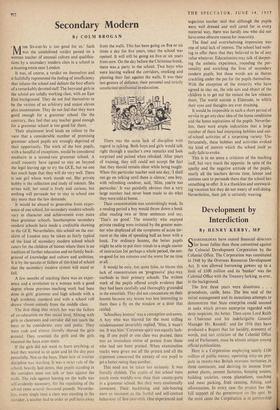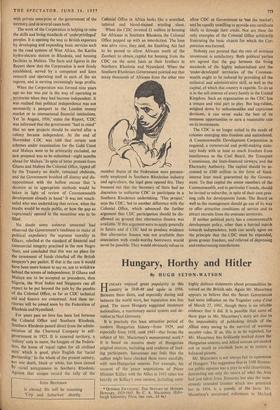Development by Interdiction
By HENRY KERBY, MP SIIAREHOLDERS have ousted financial directors for lesser follies than those committed against the Colonial Development Corporation by the Colonial Office. The Corporation was constituted in 1948 by the Overseas Resources Development Act. It was allowed borrowing powers up to a limit of f100 million and its `banker' was the 'Colonial Office with the Treasury lurking, as ever, in the background.
The first three years were disastrous . . . groundnuts, cattle, hens. The less said of the initial management and its incautious attempts to demonstrate that State enterprise could succeed in tasks which private enterprise regarded with deep suspicion, the better. Then' came Lord Reith as Chairman and his indefatigable General Manager Mr. Rendell : and for 1956 they have produced a Report that for lucidity, economy of words, and tart criticism of the Colonial Office and of Parliament, must be almost unique among official publications.
Here is a Corporation employing nearly £100 million of public money, operating sixty-six pro- jects in twenty-two British overseas territories in three continents, and deriving its income from power plants, cement factories, housing estates: building societies, cocoa plantations, ranching and meat packing, fruit canning, fishing, and afforestation. In every case the project has the full support of the government on the spot. In the most cases the Corporation is in partnership with private enterprise or the government of the territory, and in several cases both.
The work of the Corporation is helping to raise the skills and living standards of 'underprivileged' peoples. It is opening the way to British exporters by developing and expanding basic services such as the road 'systems of West Africa, the Kariba hydroelectric station in Rhodesia, and housing facilities in Malaya. The facts and figures in the Report show that the Corporation is now firmly established, served by a competent and keen research and operating staff in each of the six regions, and is earning increasingly large profits.
When the Corporation was formed nine years ago no bar was put in the way of operating in territories when they had become independent. It was realised that political independence was not necessarily a passport to the London money market or to international financial institutions. Yet 'in August, 1956,' states the Report, `CDC was informed that the government "had in mind" that no new 'projects should be started after a colony became independent. At the end of November CDC was told that certain new schemes under examination for the Gold Coast and Malaya were to be arbitrarily excluded, no new proposal was to be submitted—eight months ahead for Malaya.' In spite of bitter protests from Ghana and Malaya the Colonial Office, tipped off by the Treasury no doubt, remained obdurate, and the Government brushed off dismay and dis- appointment with the hollow excuse that 'a decision as to appropriate methods would be taken in light of review of Commonwealth development already in hand.' It was not vouch- safed who was undertaking that review, when the results would be made public, or how the gap so capriciously opened in the meantime was to be filled.
No doubt some autocrat unnamed had observed the Government's readiness to make of political expediency the supreme morality in Ghana, rebelled at the standard of financial and Commercial integrity practised in the new Negro State, and concluded that this was no place for the investment of funds chiselled off the British taxpayer's pay packet. If that is the case it would have been more honest to say so, not to withdraw behind the screen of independence. If Ghana and Malaya are to be accepted as precedents, then Nigeria, the West Indies and Singapore can all expect to be put beyond the pale by the pundits of the Colonial Office, as far as CDC technical aid and finance are concerned. And these ter- ritories will be joined soon by the Federation of Rhodesia and Nyasaland.
For years past no love has been lost between the Colonial Office and Southern Rhodesia, Southern Rhodesia passed direct from the admin- istration of the Chartered Company to self- government in 1923. It is annexed territory, a `colony' only in name, the kingpin of the Federa- tion, the home of 'equal rights for all civilised men' which is good, plain English for 'racial Partnership.' In the whole of the present century, not one death, black or white, has been caused , by racial antagonisms in Southern Rhodesia. Against that unique record the tally of the
JOHN BETJEMAN
is abroad. He will be resuming 'City and Suburban' shortly. Colonial Office in Africa looks like a scorched, tattered and blood-stained. winding sheet.
When the CDC invested El million in housing for Africans in Southern Rhodesia the Colonial Office popped up with an interdiction. The loan was ultra vires, they said. An Enabling, Act had to be passeci to allow. Africans south of the Zambezi to obtain ;capital for housing from the CDC on the same basis as their brothers in Northern Rhodesia and Nyasaland. When the Southern Rhodesian Government pointed out that many thousands of Africans from the other two member States of the Federation were perman- ently employed in Southern Rhodesian industry and agriculture, the legal guns opened fire. They boomed out that the Secretary of State had no discretion to authorise CDC to participate in a Southern Rhodesian undertaking. 'This project,' says the CDC, led to another difference with the Colonial Office, which advanced the further argument that CDC participation should be dis- allowed on ground that alternative finance was available.' If this argument were to apply generally in future and if CDC had to produce evidence that alternative finance was not available then association with credit-worthy borrowers would never be possible. They would obviously refuse to allow CDC or Government to 'test the market'; and be equally unwilling to provide any certificate likely to damage their credit. Nor are these the only examples of the Colonial Office arbitrarily frustrating 'the basic objects for which the Cor- poration was formed.
Nobody can pretend that the rate of overseas investment is satisfactory. Both political parties are agreed that the gap between the living standards, of the highly industrialised and the 'under-developed' territories of the Common- wealth ought to be reduced by providing all the technical and administrative skill, as well as the capital, of which this country is capable. To do so is in the self-interest of every family in the United Kingdom. Such an organisation as the CDC has a unique and vital part to play. But hag-ridden, weighed down by unbusinesslike and capricious decisions, it can never make the best of its immense opportunities or earn a reasonable rate on its investments.
The CDC is no longer suited to the needs of colonies emerging into freedom and nationhood. A Commonwealth Development Corporation is required, a commercial and profit-making statu- tory body with at least as much freedom from interference as the Coal Board, the Transport Commission, the State-financed airways, and the Electricity Authority. The capital should be in- creased to £500 million in the form of fixed- interest loan stock guaranteed by the Govern- ment. To that capital the senior members of the Commonwealth, and in particular Canada, should be invited to subscribe, in spite of their own pres- sing calls for development funds. The Board as well as the management should go out of its way to offer attractive conditions of service and to attract recruits from the overseas territories.
If neither political party has a commonwealth development policy, other than a hurried march towards independence, both can surely agree on the principle that the .CDC must be expanded, given greater freedom, and relieved of depressing and embarrassing interdictions.



































 Previous page
Previous page